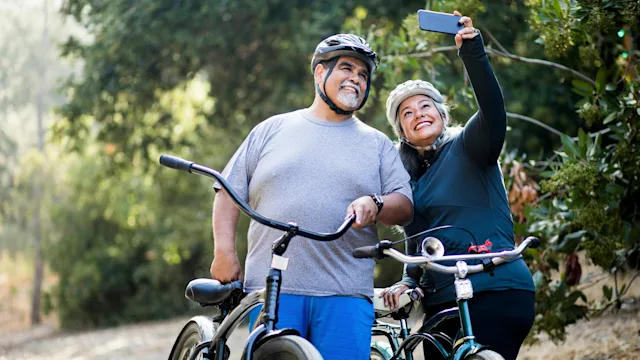Key takeaways:
People with body image issues hold negative beliefs about their bodies, which can lead to emotional distress, harmful behaviors, and disordered eating habits.
To help someone who is struggling with a negative body image, be mindful when you talk about appearances, discourage social media use, and model healthy behaviors.
Treatment can help those with body image issues, including those who also have body dysmorphic disorder (BDD) or an eating disorder.
Body image refers to how you think and feel about your body and its appearance. Your body image can be positive, negative, or somewhere in between. A large number of people struggle with their body image at some point in their life. Having a negative body image is linked to eating disorders and other mental health issues, so getting help is important.
If someone you know struggles with their body image, there are things you can do to help support them.
How to help somebody struggling with body image issues
As a family member or friend, you may not be able to change how your loved one views their appearance. But you can play an important role in encouraging them to have a more positive or neutral body image. Read on for tips on how to help someone dealing with body image issues.
1. Use compliments wisely
When someone you care about struggles with their body image, you may feel a strong urge to compliment their appearance. You want to be careful when doing this, though.
If the compliments are not genuine, the person might detect this and it can make them feel worse. Compliments about appearance may also bring attention to particular issues the person has with their body and communicate that their appearance is being evaluated.
If you want to compliment the person’s appearance, be sure to only offer genuine compliments. Also, make an effort to compliment other things, like their personality, character, and achievements.
2. Encourage alternatives to social media
Social media can provide an opportunity for social connection, but it is also linked to body image issues and disordered eating. Spending time on social media can be detrimental for anyone who already struggles with a negative body image.
If you suspect that your loved one is negatively affected by social media, consider talking to them about its potential negative effects. Encourage alternative activities and other ways to connect with people.
3. Model a healthy relationship with your body
Whether you are a parent, other family member, or friend of someone experiencing body image issues, you can help them by modeling a healthy relationship with your own body. Be mindful of how you talk about your appearance and eating habits.
Read more like this
Explore these related articles, suggested for readers like you.
If you catch yourself saying something negative about your own appearance, stop and redirect. Young people in particular are very aware of how other people talk about their bodies.
What not to do for someone living with body image issues
When it comes to supporting someone through sensitive issues related to their body image, what you don’t do is just as important as what you do. As much as you can, try to avoid the following, which may only make things worse:
Disregarding their feelings about how they look
Shaming them for struggling with their body image
Forcing them to talk about their body image issues when they’re not comfortable
Commenting on their body, weight, or eating habits
Commenting on your own body or other people’s bodies, especially in a negative way
Comparing yourself or your loved one to people on social media
Remember that your actions sometimes speak louder than your words. You have the opportunity to model how to have a healthy body image by showing love and respect to your own body. This can come across in the ways that you talk about your appearance and in how you take care of your body.
Signs and indications that someone may be struggling with body image
It can be difficult to know when a loved one is struggling with their body image. Some people may hide their feelings out of shame or embarrassment. Others may be more forthcoming.
Signs that a person may be struggling with their body image include:
Expressing unhappiness about their body
Using negative terminology to describe their body
Avoiding looking at their body
Excessively looking at or checking their body
Dieting or exercising excessively
Being extremely focused on weight loss methods or changing an aspect of their body they don’t like
In severe cases, a person with a negative body image may have body dysmorphic disorder (BDD). BDD is a type of obsessive-compulsive disorder. People with BDD experience the following:
A preoccupation with one or more perceived flaws in their appearance
The flaws are either completely unnoticeable or seem minor to other people
Distress due to perceived flaws causes them to engage in repetitive behaviors or mental acts, such as excessive grooming or constantly comparing themselves to others
There is also an overlap between negative body image and eating disorders. Plenty of people with body image issues do not have an eating disorder, but there is a connection. The signs of an eating disorder vary depending on the specific type:
Anorexia: People with anorexia have a strong fear of gaining weight. As a result, they either restrict how much food they eat or binge and purge.
Bulimia: With bulimia, people have episodes of eating very large amounts of food, during which they feel like they cannot control how much they are eating. After a binge, they attempt to make up for it by vomiting, fasting, or other means.
Binge-eating disorder: People with binge-eating disorder have episodes of eating very large amounts of food, but without purging afterward.
What circumstances cause body image issues?
Negative body image is a part of mental health conditions like BDD and eating disorders. But people without these conditions may also struggle with body image. There are many different circumstances that can contribute to developing a negative body image, and they vary from person to person.
Some factors and experiences that can lead to body image issues are:
Weight bias and stigma: People who have a larger body size are more likely to feel self-conscious about their weight and struggle with body image issues. This is often due to the weight discrimination, exclusion, and fat shaming they experience in society.
Social media use: Social media plays a significant role in body image issues. People who use social media are more likely to compare themselves to others and experience body image dissatisfaction. This is especially true for teens.
Media: Other forms of media, such as television, magazines, and music,promote certain ideals regarding body shape and size. People of all ages may find themselves striving to attain these often unrealistic ideals.
Bullying: Children and teens who are bullied for their appearance are more likely to struggle with body image and eating issues as they get older.
Family: Families play a critical role in shaping a person’s relationship to their body and to food. Parents can directly or indirectly affect a child’s body image. Direct behaviors can include telling a child that they should lose weight or putting them on a diet. Indirect behaviors include a parent criticizing their own body and engaging in unhealthy dieting.
What is the best treatment for body image issues
Treatment is available for people experiencing body dysmorphic disorder and eating disorders related to body image issues. These conditions are treated with therapy and medication. In the case of eating disorders, it’s also important to get nutritional counseling and work with a medical team.
Therapy
Therapy for BDD can help people develop a more accurate and positive view of themselves. Therapies used to treat BDD include:
Cognitive behavioral therapy (CBT): CBT is a type of therapy that can focus on helping a person develop healthier thoughts and beliefs about their body.
Motivational interviewing (MI): MI is an approach that builds motivation for change in people who may be resistant.
Acceptance and commitment therapy (ACT): ACT helps people accept, rather than resist, uncomfortable thoughts and feelings.
Therapy for eating disorders focuses on helping people develop a healthier relationship with food and with their bodies. Therapies used to treat eating disorders include:
Cognitive behavioral therapy: CBT for eating disorders helps people identify and change negative thoughts that contribute to unhealthy eating habits.
Psychodynamic therapy: Psychodynamic approaches focus on unconscious emotions and relationship issues and how they relate to a person’s relationship with food.
Family therapy: Family therapy can help family members identify and change negative communication patterns and behaviors that can contribute to a person’s eating disorder.
Medication
There are no FDA-approved medications to treat body image issues. However, selective serotonin reuptake inhibitors (SSRIs), a group of antidepressants, may be prescribed off-label to treat BDD.
SSRIs used to treat BDD include:
Fluoxetine (Prozac)
Escitalopram (Lexapro)
Sertraline (Zoloft)
Fluvoxamine (Luvox)
Paroxetine (Paxil)
Medications may also be used to treat eating disorders. The type of medications prescribed vary depending on the specific type of eating disorder. Your healthcare provider will recommend the best medication for your situation.
Mental health resources for body image issues
If you or someone you know is struggling with negative body image, BDD, or an eating disorder, support and resources are available. To locate a treatment provider or facility, call SAMHSA’s National Helpline at 1-800-662-HELP (4357) or use the online treatment locator.
More information and support for body dysmorphic disorder is available from the following organizations:
For more information and support for eating disorders, visit the websites of the following organizations:
The bottom line
Body image is a sensitive topic that affects people of all ages, shapes, and sizes. If someone you know has body image issues, you can help them by being mindful about how you talk about appearances, discouraging social media use, and modeling healthy behaviors. Treatment can also help people develop healthier thoughts, feelings, and behaviors when it comes to their bodies and food.

Why trust our experts?



References
Abbate-Daga, G., et al. (2016). A comprehensive review of psychodynamic treatments for eating disorders. Eating and Weight Disorders - Studies on Anorexia, Bulimia and Obesity.
American Psychiatric Association. (2019). Body dysmorphic disorder and a culture of perfection.
Dehbaneh, M. A. (2018). Effectiveness of acceptance and commitment therapy in improving interpersonal problems, quality of life, and worry in patients with body dysmorphic disorder. Electronic Journal of General Medicine.
Franchina, V., et al. (2018). The influence of social media use on body image concerns. International Journal of Psychoanalysis and Education.
Gattario, K. H., et al. (2019). Life after childhood bullying: Body image development and disordered eating in adulthood. International Journal of Behavioral Development.
Holland, G., et al. (2016). A systematic review of the impact of the use of social networking sites on body image and disordered eating outcomes. Body Image.
Hosseini, S. A., et al. (2023). Body image distortion. StatPearls.
Jiotsa, B., et al. (2021). Social media use and body image disorders: Association between frequency of comparing one’s own physical appearance to that of people being followed on social media and body dissatisfaction and drive for thinness. International Journal of Environmental Research and Public Health.
National Institute of Mental Health. (2023). Eating disorders.
Office on Women’s Health. (2021). Body image. U.S. Department of Health and Human Services.
Phillips, K. A. (2022). Top 10 recommendations for treating body dysmorphic disorder (BDD) with medication. International OCD Foundation.
Singh, A. R., et al. (2019). Understanding and treating body dysmorphic disorder. Indian Journal of Psychiatry.















